Klein, Naomi (2014-09-16).
This Changes Everything: Capitalism vs. The Climate
Simon & Schuster. Kindle Edition.
“[B]ottom line[:] our economic system and our planetary system are now at war. Or, more accurately, our economy is at war with many forms of life on earth, including human life. What the climate needs to avoid collapse is a contraction in humanity’s use of resources; what our economic model demands to avoid collapse is unfettered expansion. Only one of these sets of rules can be changed, and it’s not the laws of nature.” –Naomi Klein, This Changes Everything, p. 21
On the night before September’s climate demonstrations in New York and well-timed publication of her new book, Naomi Klein appeared alongside Bill McKibben, Chris Hedges, Kshama Sawant and Bernie Sanders, rock stars of the budding U.S. coalition of “climate justice” activists, in a refreshingly agonizing display of American white folks trying to start something (apologies to Ms. Sawant.) If you ask Chris Hedges, that something is quite clearly an overthrow of the corporate state. But after reading Ms. Klein’s new political masterpiece providing a powerful ideology for that overthrow, one has to wonder. Will this soon be the handbook for a revolution that topples the global plutocracy? Or is it more likely just the latest required reading in popular “social sustainability” courses?
Make no mistake, the book’s philosophical thrust is pure anti-capitalism and a tried and true attack on Western cultural myths of human ascendancy, but her political target is the fossil fuel industry and “deregulated capitalism” and we’re immediately unsure what kind of revolution she has in mind. How much of the economy will be planned? How will fossil fuel corporations “continue being rich for the foreseeable future” while they’re quickly taxed into oblivion AND politically muzzled? How will existing fossil fuel dependent infrastructure (like the U.S. suburbs) be decommissioned? We’re left hanging between an almost glorious ideology (for those of us who’ve waited so long for the truth to be spoken out loud again) and a stubborn pragmatism that paints an urban, well-populated post-overthrow world that’s unconvincing as a picture of zero carbon emissions. But at least we’ll all work for a co-op, put in fewer hours, use public transit, and reliably vote Democratic.
Despite that, Naomi Klein does create a strong, classic ecological theme in the book, a real accomplishment given her wide audience. As I said, philosophically, she gets it – the problems go much deeper than capitalism and the political right and are far older than Ronald Reagan. These powerful critiques of Western culture are by no means new and constitute a polished, well-studied thesis in “old-school” environmentalism, with the notable omission of population as a factor in global warming. Very importantly, she mocks the idea of “decoupling” economic activity from environmental impacts, a foundational greenwashing lie that progressives (and some environmentalists) fell for decades ago. And she has extensive references to the need for real reductions in overall energy consumed, fair and shared sacrifices, lifestyle changes, and cultural changes in favor of the “stewardship” relation to Earth and land.
“[T]he shift will require rethinking the very nature of humanity’s power— our right to extract ever more without facing consequences, our capacity to bend complex natural systems to our will. This is a shift that challenges not only capitalism, but also the building blocks of materialism that preceded modern capitalism, a mentality some call ‘extractivism.'” –Naomi Klein, This Changes Everything, p. 25
So it’s when she tries talking specifics about where we’re headed to her progressive audience that she gets in trouble. For example, returning to a 1970’s lifestyle (and by inference using that as the global convergence level for a projected 9 billion people) doesn’t even sound sustainable, let alone sufficient to get to zero carbon emissions. But she has to give ‘em what they want, like calling for policies making low-carbon choices both fair and “easy and convenient for everyone.” And she repeatedly refers to “low-carbon sectors” of the economy as if such a thing exists. As if hospitals and schools don’t depend on heavy industry and manufacturing to make them possible. Worse, despite the need for drastic overall economic contraction and having savaged the very idea of economic growth, she encourages growth of these sectors, primarily as a political salve to progressives who’ll be terrified about getting tagged with the “anti-growth” label.
And then there’s the fact that she’s mainstream, and therefore human-centered, but for this book, and I think sincerely, Klein’s had to insert a core environmental-values structure. This leads to conflicts because honest environmentalism can no longer provide answers that society wants to hear. Supporting her assault on capitalism, Klein’s thesis is straight out of classic environmentalism’s critique of human nature as expressed in capitalist societies. “Are we masters, here to subdue and dominate, or are we one species among many?” she asks, putting herself right there with Thoreau, Muir, Leopold, Carson, and The Limits to Growth.
But how does Klein square that in her own mind with her subtle, conditional support for global implementation of industrial-scale wind and solar power? We’re pretty sure she’s ultimately a left-wing journalist and writer. And whereas Deep Green Resistance was a sneak attack by the Left on the hard-core enviro camp, This Changes Everything is a long-overdue full frontal assault on the exposed and defenseless mainstream Greens, with Naomi Klein easily carrying away the flag. But now that she’s taken global warming for the Left, does she really want it? The answer hinges on the differences in traction she’ll get between true climate mitigation (i.e., planned, global, drastic emissions reductions) and adaptation (everything else).
“[Anderson and Bows-Larkin] argue that, if the governments of developed countries want a fifty-fifty chance of hitting the agreed-upon international target of keeping warming below 2 degrees Celsius, and if reductions are to respect any kind of equity principle between rich and poor nations, then wealthy countries need to start cutting their greenhouse gas emissions by something like 8 to 10 percent a year— and they need to start right now.” –Naomi Klein, This Changes Everything, p. 87
OK, so Klein’s thesis that our current economic system can’t make those drastic emissions cuts in time (or anything even close) is rock solid. For any chance of meeting the 2C goal, that system must be overhauled. Agreed. And annual emissions reductions of the needed magnitude and duration have no historic parallel other than deep, prolonged economic depression. Agreed. But then she says we can “avoid that kind of carnage” through careful management of Anderson and Bows-Larkin’s “radical and immediate de-growth strategies in the US, EU and other wealthy nations.”
Klein admits the apocalyptic sound of this, but only because we all still worship at the altar of Growth. Then she kinda feebly hopes that planned, rapid economic contraction won’t look like the Great Depression. (Tellingly, she links here to a global consciousness raising site whereas, for example, Richard Heinberg’s thoughts on contraction would have been infinitely more appropriate.) Thank you Naomi, for hinting it like it is. One more thing, we can’t forget those simultaneous massive wealth transfers to the developing countries who manufacture all of our gadgets, otherwise they won’t go for it. Now how are we going to make this happen?
“We need to turn things around by the end of this decade; the ecological clock is ticking and we have no time to waste. If we think realistically, are we going to build this [climate-only] movement of millions in that short time, no, but do we have the potential to weave together all of our existing movements and supercharge them with existential urgency? Yes! I believe in deadlines! Without deadlines, nothing gets done.” -Naomi Klein, September 20, 2014
Well, no surprise, but you don’t have to read between too many lines to see that those deadlines are a means to a political end, with actual climate mitigation finishing second. Note that “turning things around” isn’t nearly good enough. In fact, the world’s non-agricultural emissions must relentlessly nosedive until reaching ZERO by 2040, according to the very same Kevin Anderson article that Klein cites repeatedly. And though she casually alludes to this a few times, readers of This Changes Everything just aren’t given a real picture of the SCALE of everything that needs to change: 9 billion civilized humans with zero carbon emissions beyond agriculture.
So it’s urgency that Klein really wants out of those deadlines: climate change (or the better named “climate justice”) should be the progressive banner issue, a cause with revolutionary power linking activists seeking to level the playing field on everything from human rights to immigration, good jobs, a basic income, and money in politics. Why? Because keeping most of the remaining fossil fuels in the ground forever implies a regulatory regime that would kill free-market capitalism, and ergo, a complete power shift to governments from the private sector. This simple truth is obvious to right-wing conservative white males, explaining their desperate effort to deny the science. But weak-kneed progressives, having been snowed into cheering for globalization, just can’t see it, and thus, sadly, the need for this book. At another pre-march appearance that night, Klein hung her head and admitted “I still cannot figure out why it took us so long to engage on this issue (i.e., climate).” Later she answered her own question: “because the science is just terrifying” but also in the book, “[we] thought Big Green had this issue covered.”
And I have to note that despite the looming deadlines, her political wisdom counsels prioritizing near-term progressive victories, like maybe a basic minimum income, as a truly stunning and worldview-changing event, in the hopes that CO2 emissions reductions would soon follow. In fact, it’s brilliant politics, because unlike climate campaigns up to now that held out the possibility of saving the planet for future generations, Klein’s movement offers hope for (non-climate) benefits people might actually live to see. Meanwhile, those deadlines seem more and more impossible when she talks about the “civilizational leap required of this fateful decade.”
Additional ammo for the cause comes from the adaptation side as she reminds us that trying to deal with the coming disasters with our current winner-take-all society leads to the Shock Doctrine’s blatant profiteering on hyperdrive. If you want to avoid that, you build progressive communities, empowered and defensible, having the resources to deal with things as they come. In 1st world countries, this approach actually has a good chance of becoming a political winner, perhaps very soon, in many left-leaning localities where capitalists already think capitalism is a dirty word.
Constructing a backbone for progressives is a big job of course, and the whole thing rests on knowing where the money for all this will come from. Klein cites a U.N. study conservatively estimating governments would need $1.9 Trillion a year for 40 years, half of the total going to developing countries, in order to save civilization justly from the climate catastrophe. And since we can’t count on the super-elites at the annual Davos shindig volunteering for the job, the revolution’s gonna have to figure out how to grab a huge chunk of the money using democratic means. Klein’s job is to assure her readers that the money’s there and what those means are.
She mentions the need for governments to coordinate so Davos funds will be harder to hide from the tax man, but she doesn’t consider the ephemeral nature of wealth itself, held mostly in the form of investments or relationships between entities. An earth-shaking revolution of the kind envisioned could easily make half the world’s money disappear, just like it did in ’08-’09. And taxing economic flows assumes those flows are still there after the tax becomes law. Nevertheless, Klein points to: a financial transaction tax, closing offshore tax havens, a 1% annual tax on billionaires’ assets, slashing military budgets, a $50/ton tax on carbon emitted, and eliminating fossil fuel subsidies, all together bringing in $2T per year. But first, we gotta remove all the money from politics so our newly elected leaders can enact those laws. And the impact on overall prices in the economy is left as an exercise for the reader.
“It wasn’t that there was no role for the public. We were called upon periodically to write letters, sign petitions, turn off our lights for an hour, make a giant human hourglass that could be photographed from the sky. And of course we were always asked to send money to the Big Green groups that were supposedly just on the cusp of negotiating a solution to climate change on our behalf. But most of all, regular, noncelebrity people were called upon to exercise their consumer power— not by shopping less but by discovering new and exciting ways to consume more. And if guilt set in, well, we could click on the handy carbon calculators on any one of dozens of green sites and purchase an offset, and our sins would instantly be erased.” –Naomi Klein, This Changes Everything, p. 212
It’s been four years since The Nation published a memorable exposé of BP and Shell’s implicit buyout of certain “Big Green” groups’ climate policies, so I had hopes for more this time around. Maybe like outing specific donations from global fossil fuel barons or their foundations à la Jim Stiles, or connecting the dots better between chapters on “Green Billionaires” and mainstream environmentalism. Likely because of our tax laws’ noticeable shielding of “non-profit” donations, my hopes will have to wait. But Klein does torpedo and sink any remaining image of Big Green (EDF, TNC, CI, NRDC and the Sierra Club) as left-wing activism, and exposes it for the right-wing Trojan horse that it is. If people like Naomi Klein once thought these groups were here to save the planet, imagine how many millions of Americans subconsciously believe their $35/year enviro dues are helping to “stop” global warming. We’re looking at both the complete success and the precise function of the Greenwash Business Model, brought to you by those very same rich folks at Davos.
And given how deep this particular kind of delusion penetrates the American psyche, Klein needed a whole book discrediting it, but for now we’ll have to settle for one good chapter. Besides supporting NAFTA (the first fight over global free trade), having corporate CEOs on their boards, greenwashing everything from fracking to laundry detergent to Wal-Mart, McDonalds, FedEx and AT&T, taking fossil fuel money, investing heavily in fossil fuel stocks, starting the Center for Sustainable Shale Development, presenting climate as an issue “with no end of profitable solutions”, hyping carbon trading markets, carbon offsets, and natural gas as a “bridge fuel”, and one group even drilling for oil on their own conservation holdings, what else do you need to know about Big Green’s climate efforts?
“For any of this to change, a worldview will need to rise to the fore that sees nature, other nations, and our own neighbors not as adversaries, but rather as partners in a grand project of mutual reinvention. That’s a big ask.” –Naomi Klein, This Changes Everything , p. 23
But let’s finish with the revolution, the essence of Klein’s work. Her conclusion has by far the single most helpful research effort in the book: a review of democratic social movements, with the goal of finding out whether a grassroots-led, non-violent economic shift of the scale needed to overthrow the fossil fuel industry has ever happened before. She notes the importance of measuring the economic results, as almost all of the movements studied achieved some legal and political victories, but few could claim real monetary gains for their members, at least in the short run. The review’s more interesting than the answer, easily guessed, which is no. (The 1930’s labor victories don’t really qualify, being of insufficient economic scale.) One major effort did take on interests whose assets approached in value what’s needed today but, alas, it was a bloodbath.
And then there are the revolutionaries themselves, “griping, tweeting, flash mobbing, and occupying” but lacking the structure and organizing power of labor unions and political parties of the traditional Left. Instead, we are reflections of the victorious right-wing ideological project, seeing ourselves as “little more than singular, gratification-seeking units” totally absorbed with “the never-ending feed of the perpetual now” and thus cut off from “the broader communities whose pooled skills are capable of solving problems big and small.” As Naomi Klein and all the rest of us know, the obstacles stacked against this bourgeois bohemian revolution seem insurmountable.
Bad timing, Klein says, ultimately delayed our understanding of capitalism as the cause of global warming and Bill McKibben, sitting next to her on the dais, looked too weary to roll his eyes. It’s painful to watch a culture slowly come to the realization that there just won’t be enough energy to sustain our way of life into the future. This Changes Everything has to take a step back in time so it can take a step in the right direction, while revealing a progressive revolution still needing a lot better grip on reality. But capitalism is rapidly being discredited in the 1st world, perhaps even in the eyes of many of the attendees at Davos. That ecological clock keeps ticking. We shall see.
Contact the author at: meyerdoug43@gmail.com
To read the PDF version of this article, click here.
To comment, scroll to the bottom of the page.
Don’t forget the Zephyr ads! All links are hot!

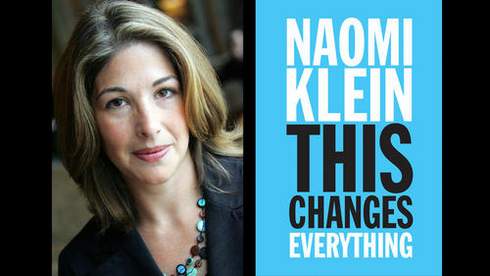
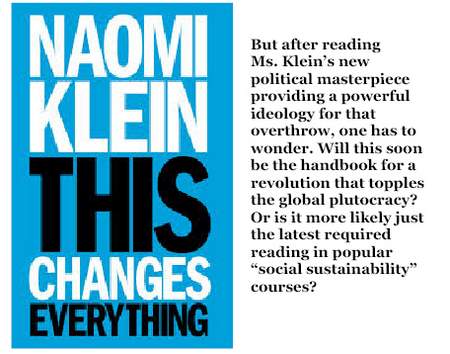
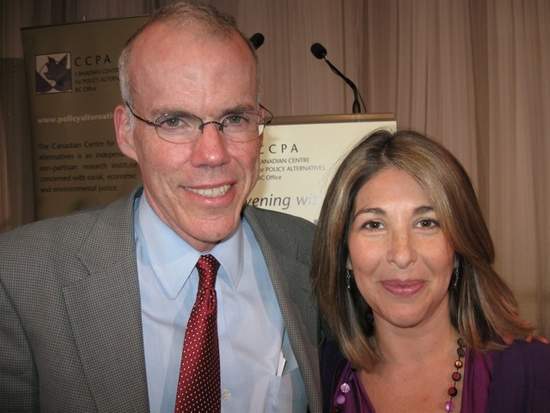
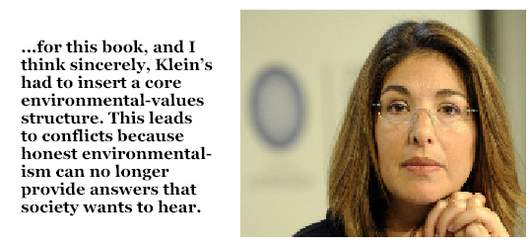
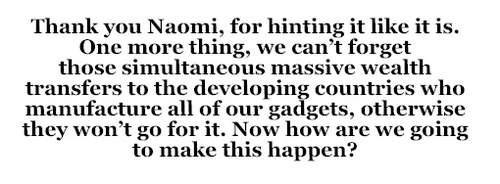
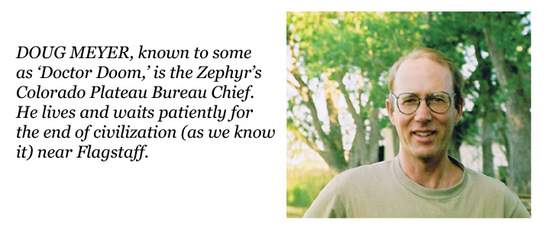






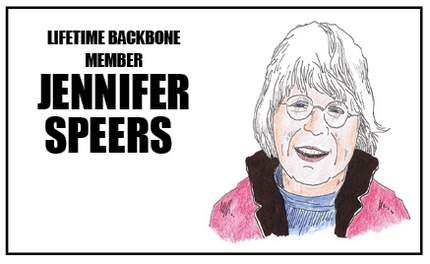
Rocky Mountain Institute is doing great work figuring out how to use less energy while improving our standard of living. Regenerative agriculture removes carbon from the air while improving the soil. We can stop the race to the bottom.
A solid, comprehensive review, giving Naomi Klein credit for voicing much that needed to be said, while highlighting her book’s weak spots and un-realisms. I suspect the latter are to a large extent explained by her eagerness not to scare away supporters of the grassroots climate justice political movement.
That’s because, as Doug says, honest environmentalism can no longer provide answers that society wants to hear – including left-leaning activists. That’s the conundrum she had to contend with in writing the book.
I don’t think either the so-called left or the mainstream, much less the right wing, are prepared for a completely frank discussion of what climate change means and I suspect Naomi Klein knows that.